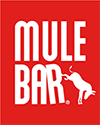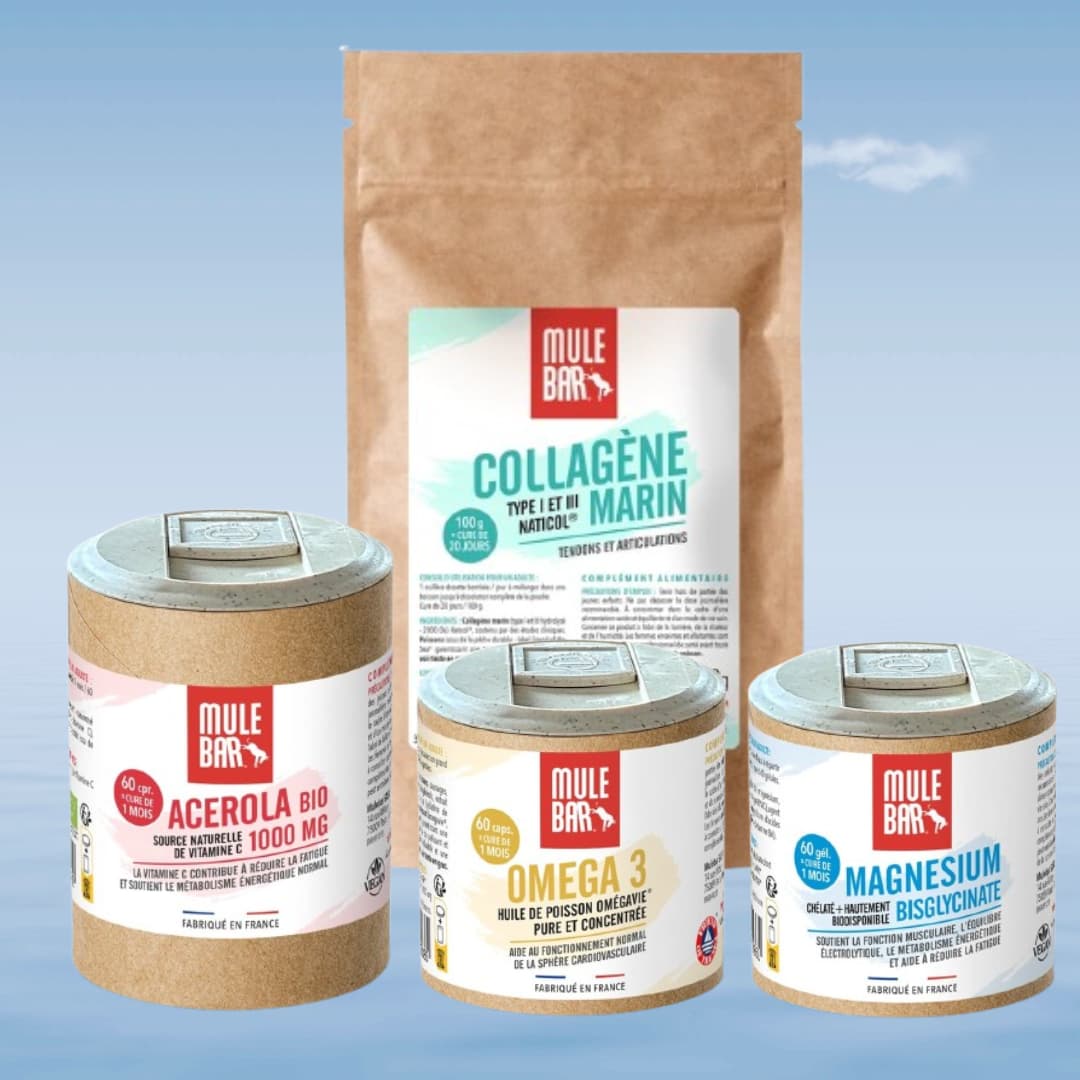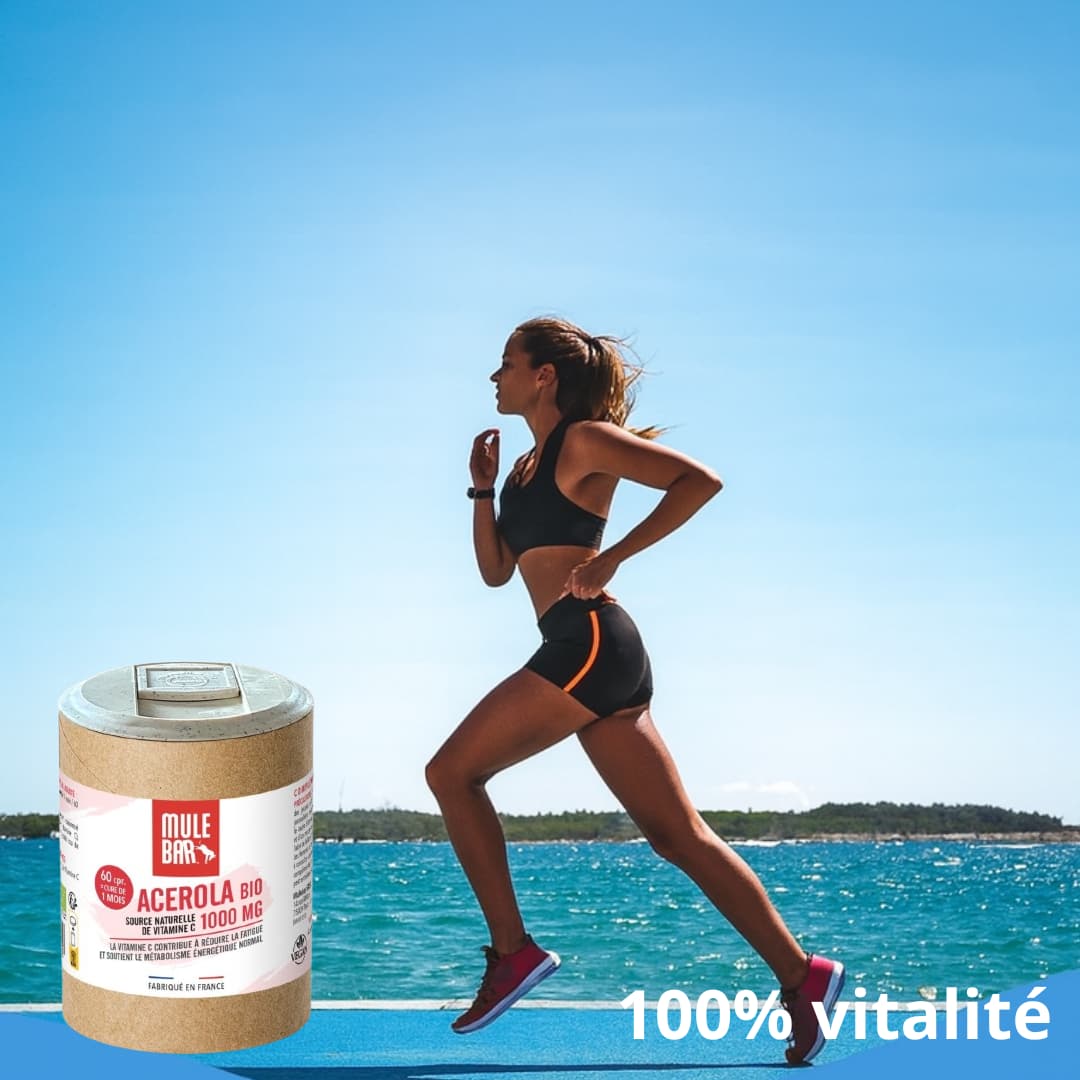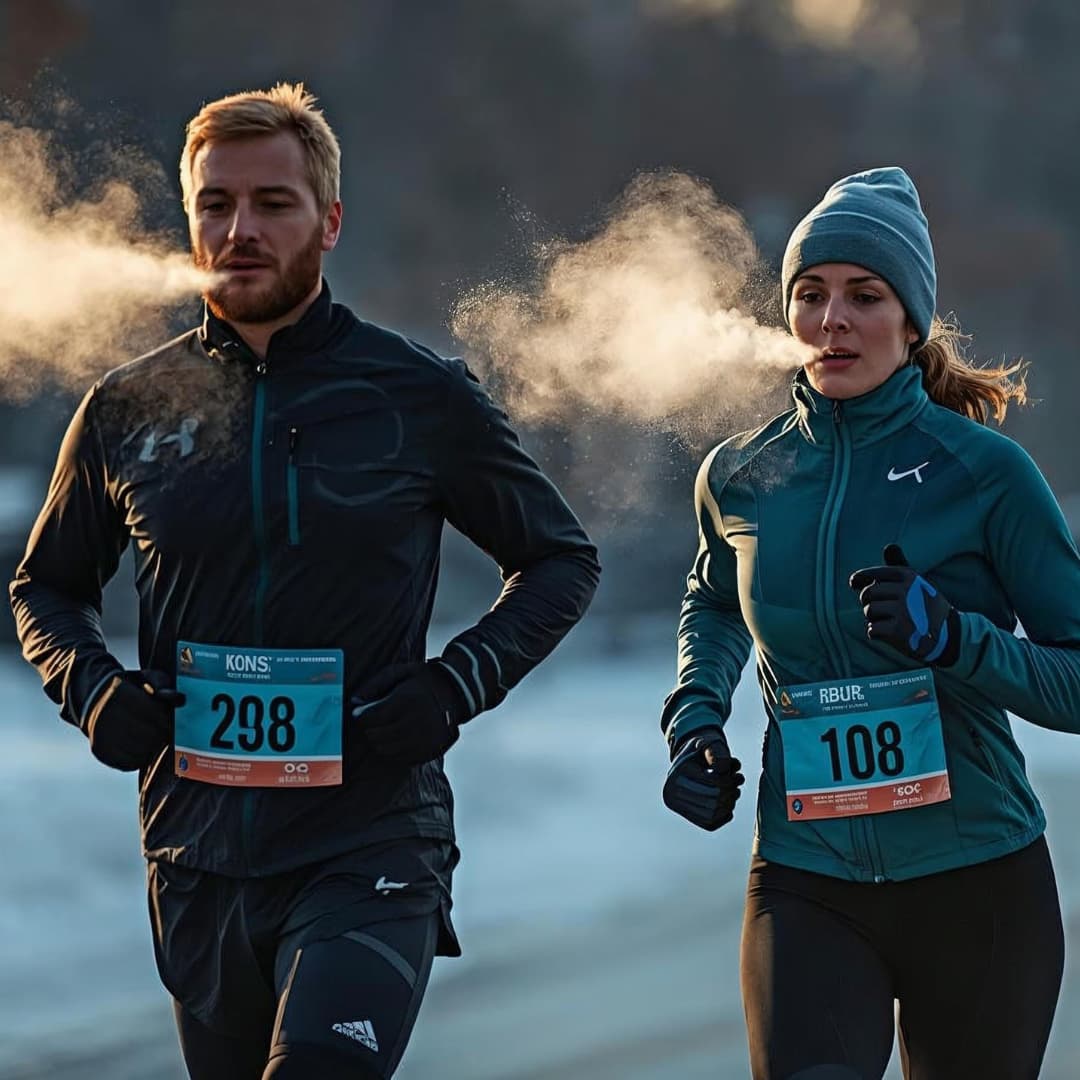Athletes are always looking for natural ways to boost their performance and optimize their recovery. Among the essential nutrients, vitamin C stands out for its many benefits. This guide reveals how the benefits of vitamin C for athletes can transform your workout, with practical advice on recommended dosages, the best food sources, and the ideal time to get the most out of it.
Vitamin C and its benefits for sport
Vitamin C plays a central role in athletes' nutrition. Its multiple actions make it an essential nutrient for anyone who engages in regular physical activity. This water-soluble vitamin is involved in many biological processes essential to muscle performance and recovery. Understanding how vitamin C helps repair tendons demonstrates its key role in injury prevention.
Why Vitamin C Helps Performance
The benefits of vitamin C for athletes are explained by several key physiological mechanisms. This nutrient acts as a cofactor in numerous enzymatic reactions that directly influence physical performance.
- Energy metabolism : Vitamin C participates in the production of L-carnitine, crucial for transforming fats into energy during prolonged efforts.
- Muscle oxygenation : it improves iron absorption and hemoglobin formation, thus optimizing oxygen transport to the muscles and reducing fatigue.
- Nerve function : it contributes to the synthesis of dopamine and adrenaline, essential for motivation and coordination during exercise.
These actions demonstrate that sufficient vitamin C intake is crucial during intense training phases. Endurance athletes such as runners particularly benefit from these effects, as do bodybuilders during a cutting period.
Research shows that athletes have higher vitamin C requirements than sedentary individuals. This increase is due to the oxidative stress generated by exercise. Maintaining a good vitamin C status helps support performance and prevent fitness declines during intensive training cycles.
Antioxidant role and muscle recovery
Vitamin C is particularly notable for its powerful antioxidant properties. During intense physical exertion, the body produces a significant amount of free radicals. These unstable molecules can damage cells if they are not neutralized. Vitamin C acts as a shield against this oxidative stress , thus protecting muscle fibers.
This antioxidant action promotes faster and more efficient muscle recovery. Athletes who regularly consume vitamin C generally experience less muscle soreness and recover better between sessions. This protection is particularly useful for intense weight training or interval training, where oxidative stress is particularly high.
Collagen, tendons and injury prevention
Vitamin C is essential for the synthesis of collagen, the main structural protein of tendons and ligaments. It activates the enzymes necessary for the formation of bonds between collagen fibers. This role is crucial for athletes subjected to significant mechanical stress.
In cases of tendonitis, an adequate intake of vitamin C combined with collagen peptides (5 to 10g/day) improves the quality of the new tissue formed. This nutritional combination accelerates repair and the return to training. Strength athletes, who are particularly prone to joint problems, benefit significantly from this.
Injury prevention is crucial for any serious athlete. By strengthening connective tissues, vitamin C reduces the risk of traumatic and overuse injuries. It also improves the healing of micro-injuries that inevitably occur during intensive sports .
Vitamin C : Effective Dosage and Timing
To maximize the benefits of vitamin C, consuming it evenly throughout the day is essential. Since our bodies don't store it (due to its water-soluble nature), frequent intake is essential. This explains why dosage and timing are so important, especially for athletes looking to get the most out of it. Understanding the impact of vitamin C on sports helps you apply these nutritional principles more effectively.

Vitamin C: before or after exercise?
Many studies have examined the ideal timing for vitamin C. Experts generally recommend splitting the daily dose into several doses to maintain stable blood levels. For effective vitamin C dosage during exercise, splitting the amount into two doses (morning and evening) gives the best results, thus ensuring continuous availability of the nutrient.
- Before training : Consuming 250 to 500mg approximately 30 minutes before exercise allows for optimal levels during exercise and limits oxidative stress caused by physical activity.
- Post-workout : A second dose within 2 hours of the session promotes recovery and fights generated free radicals .
- Avoid excess : Too high doses immediately after exercise can interfere with certain inflammatory responses necessary for progression.
Research shows that it's best to avoid mega-doses post-workout. Excess antioxidants can disrupt cellular processes essential for muscle adaptation. The goal is to provide protection against oxidation without hindering the body's natural adaptation mechanisms.
For morning workouts, taking vitamin C with breakfast improves its absorption while reducing the risk of digestive problems. Combining it with foods rich in plant-based iron (such as spinach or lentils) enhances the absorption of this mineral, which is crucial for oxygen transport. This synergy perfectly illustrates the importance of a comprehensive approach to sports nutrition.
Bodybuilding and reasonable dosage
In bodybuilding, vitamin C requirements vary depending on the intensity and frequency of training. A daily intake of 120 to 200mg through food is generally sufficient to cover basic needs. However, during phases of intensive training or competitive preparation, moderate supplementation may be useful. Food sources of vitamin C should be the foundation, with supplements only being used as a complement to a balanced diet.
Regular bodybuilders can benefit from 200 to 500mg per day during bulking or strength-building cycles. This temporary surplus helps manage increased oxidative stress and supports recovery between sessions. Splitting this amount into two doses (morning and evening) optimizes bioavailability and reduces the risk of digestive discomfort associated with single large doses.
Practical food sources for everyday use
Natural foods remain the best source of vitamin C. Fresh fruits and vegetables not only provide this essential vitamin, but also cofactors that improve its absorption and utilization by the body. Varying your sources helps ensure a regular intake while diversifying your flavors.
- Citrus and exotic fruits : A medium orange provides 50 to 80mg, a kiwi 60 to 90mg, and 100g of papaya around 60mg of natural vitamin C.
- Colorful vegetables : 100g of raw red pepper contains 100 to 150mg, cooked broccoli 60 to 90mg, and fresh spinach about 30mg.
- Red fruits : 100g of strawberries provide 50 to 70mg, blackcurrants up to 200mg, and acerola is among the most concentrated sources.
Preserving vitamin C requires a few simple precautions. Because this vitamin is sensitive to heat and light, it's best to consume fresh fruits and vegetables, whether raw or undercooked. Keeping them refrigerated and consuming them quickly after purchase helps preserve this fragile vitamin as much as possible.
A concrete example of an optimal daily intake might include: a kiwi for breakfast, a few strawberries for a snack, and a portion of raw bell pepper in a salad for lunch. This simple combination more than meets your daily needs without systematically resorting to supplements. Incorporating these foods into your daily routine is therefore both easy and enjoyable.
Vitamin C, immunity and recovery
Vitamin C plays a key role in strengthening immunity in athletes . During intense workouts, our bodies experience physical stress that can temporarily weaken our natural defenses. This immune fragility, particularly pronounced after prolonged efforts such as marathons or periods of intense training, requires special nutritional attention to maintain health and optimize sports recovery.

Prevent colds and loss of fitness
Studies confirm the link between intensive exercise and immune weakness. Prolonged or very intense efforts lead to a temporary increase in cortisol and inflammatory molecules, creating a window of vulnerability to infections in the hours and days following exercise. This is why so many runners experience cold-like symptoms after a long-distance run.
- Preventive shield : A daily intake of 200mg of vitamin C significantly reduces the risk of respiratory infections in endurance athletes.
- White Blood Cell Boost : Vitamin C stimulates the activity and mobility of our immune cells, strengthening our natural defenses.
- Inflammatory moderator : It helps regulate the post-exercise inflammatory response, preventing excesses that are harmful to immunity.
During critical periods (intensive preparation, seasonal change), increasing vitamin C supplementation to between 300 and 500mg per day is advisable. This preventative approach gives better results than occasional intake after the onset of symptoms.
The effectiveness of this protection also depends on other factors such as sufficient sleep (7-9 hours), adequate calorie intake, and good stress management. Combining optimal nutrition, recovery, and mental well-being offers the best guarantee for maintaining strong athletic immunity.
Collagen, repair and return to training
Vitamin C is essential for the production of collagen, which is crucial for muscle and tendon recovery. This mechanism is particularly important in the context of collagen and recovery, where the quality of repaired tissue directly conditions the resumption of training.
The optimal protocol combines:
- 500mg of vitamin C morning and evening
- 5 to 10g of hydrolyzed collagen on an empty stomach
- 1 to 3g of omega-3 with a high-fat meal
This nutritional synergy promotes optimal repair of tendons and ligaments. This program typically lasts 8 to 12 weeks for complete regeneration.
Precautions and limits of high doses
Be careful not to overdo it, though. Studies show that excessive antioxidant intake could disrupt some beneficial adaptations associated with training.
- Effect on progress : More than 1000mg/day may decrease the benefits of training on mitochondria and insulin sensitivity.
- Digestive sensitivity : Beyond 2000mg/day, intestinal problems are possible (diarrhea, cramps).
- Renal precaution : For some, very high doses could promote kidney stones.
The maximum recommended limit is 2000mg/day, but for most athletes, a daily intake of between 200 and 500mg of vitamin C is more than enough. The ideal? Moderate and regular supplementation, integrated into a balanced diet, to enjoy all the health benefits without the risks.
Frequently Asked Questions
What are the main benefits of vitamin C for athletes?
For athletes, the benefits of vitamin C are particularly remarkable. A true antioxidant shield, it effectively fights free radicals produced during exercise, thus reducing oxidative stress . Essential for the production of collagen , it protects joints stressed during training . By optimizing iron absorption, it improves muscle oxygenation. The benefits for the immune system are also notable, limiting frequent infections among athletes. With such advantages, this vitamin becomes a central element of nutrition adapted to sports practice.
What dose of vitamin C is recommended for bodybuilding?
In bodybuilding , the ideal intake of vitamin C is generally between 120 and 200mg per day. During intensive training phases, this dosage can rise to 500 mg, divided into two doses for greater effectiveness. Choose fruits such as kiwis or citrus fruits, which are naturally rich in this vitamin, rather than supplements. Be careful, however, not to overdose: too much vitamin C can disrupt the body's adaptation to exercise. A balanced diet, rich in fresh produce, remains the best guarantee for optimal health and lasting performance.
Does vitamin C really help prevent fatigue in athletes?
Undeniably, vitamin C plays a major role in the fight against fatigue in athletes. By participating in energy production and promoting iron absorption, it actively combats drops in energy. Its powerful antioxidant properties protect the body against oxidative stress caused by sport. Combined with good nutrition and sufficient rest, it contributes to better recovery after exercise. This concentration of antioxidant properties makes it a valuable ally for maintaining endurance and vigor throughout training sessions.






Leave a comment
This site is protected by hCaptcha and the hCaptcha Privacy Policy and Terms of Service apply.